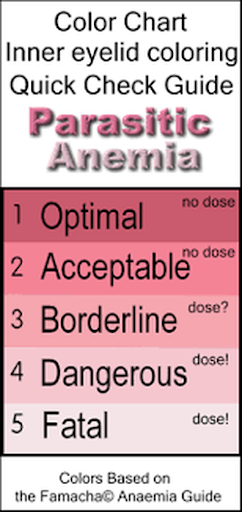FAMACHA© System: (Barber Pole Worms)
FAMACHA© is a diagnostic test to help small ruminant producers identify animals that require anthelmintic treatment and those which do not require deworming. The tool is a card that matches eyelid color to anemia levels, an indicator of clinical barber pole worm infection. Its use is limited to the parasites which cause anemia. Producers must receive training in order to receive a card. Training is now available online from the University of Rhode Island.
A solution to this problem called FAMACHA© was developed in South Africa. FAMACHA© is a clinical on-farm system for classifying animals into categories based upon level of anemia. Since anemia is the primary pathologic effect from infection with H. contortus, this system can be an effective tool for identifying those animals that require treatment (but only for H. contortus). To use FAMACHA©, the color of ocular mucus membranes are observed and compared to a laminated card which has colored illustrations of eyes from sheep at different levels of anemia. The scale goes from 1 (mucous membranes are red) to 5 (mucous membranes are white); all animals are examined at regular intervals and only animals scored as being anemic are treated. In evaluation trials in South Africa, use of FAMACHA© reduced the number of dewormer treatments given by up to 90% as compared to previous years. This system was validated in the US by the American Consortium for Small Ruminant Parasite Control (ACSRPC) as part of our “Novel methods for sustainable control of gastrointestinal nematodes in small ruminants” project, which was funded by USDA-SARE (Sustainable Agriculture Research and Education).
FAMACHA is an old technique with a new qualitative twist that involves assessment of the shades of red/pink in the lower eyelid. The FAMACHA card was developed in South Africa by a multi-institutional group of scientists and veterinarians. It has five shades of red/pink/cream that when matched to the eyelid color are accurate enough to determine whether a sheep or goat requires anthelmintic treatment to prevent death from anemia or poor performance due to the barber pole worm (Haemonchus contortus).
FAMACHA is useful for management of the barber pole worm, Haemonchus contortus, which is the worm species responsible for most death and poor performance due to worm parasites in areas with summer rainfall. The state of Missouri does have barber pole worms. Other species of worms that do not cause anemia (low red blood cell count) or bottle jaw/mandibular edema cannot be managed by FAMACHA. Not all cases of anemia are due to the barber pole worm and you will need to eliminate other factors. Coupling FAMACHA with fecal egg counts on a subset of sheep/goats will ascertain that there is no other cause of anemia. FAMACHA doesn’t replace fecal egg counts, but it can decrease the frequency or number of fecal egg counts needed to manage barber pole worm infections. FAMACHA cannot be used to monitor coccidia infestations, another major cause of lamb & kid death. Of even more importance than FAMACHA for managing worms is to select for animals that are more resistant to parasites and to manage pastures and animals so that parasites are less of an issue. FAMACHA can only do so much. Identifying productive animals with good performance that are resistant to parasites and that pass this trait on to offspring will be an important future step in small ruminant production systems as anthelmintic resistance in worm populations develops. So, start the challenge today. Call your Extension agent and ask him or her to organize a FAMACHA training session for your county or parish. Ask your vet to help train you in the use of FAMACHA.
![]()
HOW TO ORDER FAMACHA© CHARTS (University of Georgia):
"Before contacting us, please read the “Open letter to sheep and goat producers explaining the FAMACHA© program” posted on the FAMACHA section of the ACSRPC website. Please note that non-veterinarians can only purchase FAMACHA charts if they have received prior training. We cannot sell FAMACHA directly to nonveterinarians unless they have proof that they have received proper instruction in the FAMACHA method. For ordering information, please send an email to famacha@uga.edu. Email ordering and communication is the most effective and efficient manner to communicate with us, and if you have access to the internet we request that you contact us in this manner. However, if you do not have access to email you may call our laboratory at (706) 542-0742. If there is no answer, please leave a messaging stating the purpose of the call, your name, where you live, and leave a return phone number. Someone will get back to you."



Powered by Boutique Store Builder . Web Design by Avalon Rose Design.


